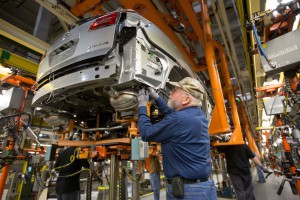
Analysts believe the new tariffs will increase the costs consumers pay for a new vehicle in the U.S.
Dealers, carmakers and suppliers were quick to criticize President Donald Trump’s order imposing tariffs on imported steel and aluminum with the exception of imports from Canada or Mexico.
“A tariff is a tax that will result in higher prices that consumers will ultimately bear,” John Bozzella, the president and CEO of Global Automakers, an organization that represents more than a dozen European and Asian automakers as well as key suppliers.
Earlier in the week, Commerce Secretary Wilbur Ross tried to downplay the impact by going on television with a can of Campbell’s Soup and telling viewers its price would increase by a fraction of a penny. But considering the amount of steel and aluminum in a typical vehicle, prices for cars could go up by hundreds of dollars, analysts warn.
“This could backfire tremendously,” warned automotive analyst David Sullivan, of AutoPacific Inc., especially at a time when the auto industry is already showing signs of weakening sales that could result in lower profits and more job cuts.
Sullivan called the president’s tariffs plan “a very tone deaf move that could negatively impact a lot of workers,” many of which voted for Trump in 2016 in critical swing states like Michigan and Pennsylvania, as well as more solid Republican states such as South Carolina and Alabama that have become major automotive manufacturing centers.
Additionally, Trump’s attempt to placate the country’s biggest steel trading partners, Canada and Mexico, are unlikely to solve the problems impacting the steel and aluminum industries in the U.S.
“Exemptions will not address the fundamental problems tariffs will create for U.S. car and truck manufacturing. Increased costs will make our industry less competitive and harm American workers, consumers, and our economy.”
Bozzella’s statements echoed those of the Motor & Equipment Manufacturers Association, which has that the tariffs would ultimately hurt many suppliers and eliminate jobs in the U.S.
(Speaker Ryan warns Trump about trade war consequences. Click Here for the story.)
“Tariffs limit access to necessary specialty products, raise the cost of motor vehicles to consumers, and impair the industry’s ability to compete in the global marketplace. This is not a step in the right direction,” said MEMA President and CEO Steve Handschuh.
MEMA represents more than 1,000 companies that manufacturer motor vehicle parts and components in the United States, strongly opposes tariffs on steel and aluminum.
The American International Automobile Dealers Association also said a 25% tariff on steel imports and a 10% tariff on aluminum imports would ultimately hurt consumers.
“Tariffs are taxes, and the American taxpayer will pay the cost of a trade war,” said AIADA President and CEO Cody Lusk. “Even with limited exemptions, tariffs will raise the sale prices of new vehicles, turning off price-sensitive consumers and leading to a dip in both auto sales and auto-related jobs.”
Manufacturers and their suppliers are trying to figure the precise cost, said Joe Phillippi, head of AutoTrends Consulting, but he estimates it will be $200 to $300 a car. Some have put the figure significantly higher, and the number could vary widely by manufacturer.
Dealers remain concerned that any new tariffs could trigger a tit-for-tat trade war, crippling an already flat auto sales market, and potentially pushing the president to act on the 25% tariff on imported European cars he raised earlier this week.
(Click Here to see more about the halted NAFTA talks and Trump’s proposed tariffs on steel, aluminum.)
Matt Blunt, president of the American Automotive Policy Council, which represents FCA US, Ford Motor Company and General Motors Co. in Washington D.C. offered a more tempered starting, praising the temporary exemption for our trading partners in Canada and Mexico is a step in the right direction.
“We are committed to working with the Administration to find a long-term solution within the new framework that supports jobs in the U.S. auto industry and across the supply chain. We fully understand the desire to take action against nations whose unfair trade practices have led to global overcapacities in steel and aluminum, and encourage the Administration to adopt a targeted approach,” Blunt said.
In its formal comments submitted to the Commerce Department on the 232 steel and aluminum investigations, AAPC highlighted the fact that its automakers source the vast majority of the steel and aluminum used in U.S.-built cars and trucks from American mills and smelters. AAPC also noted that the U.S. automotive industry purchases about 15% of the steel consumed in the U.S. and nearly 38% of all aluminum used in our country.
After a nearly year-long investigation, President Trump took action on Thursday to curb steel and aluminum imports. America’s steel and aluminum workers and companies will stabilize after years of unfair competition, regain market share and even hire more workers.
The Alliance for American Manufacturing, an organization of the United Steel Workers union and several steel makers, hailed the tariffs.
“After a nearly year-long investigation, President Trump took action to curb steel and aluminum imports. America’s steel and aluminum workers and companies will stabilize after years of unfair competition, regain market share and even hire more workers,” the alliance said in a statement.
(To see which Trump allies are ripping his tariff plan, Click Here.)
“Already, more than 500 people are headed back to work in Granite City, as U.S. Steel announced it will restart a blast furnace there. On top of that, this action will go a long way toward securing our national defense, as it will allow American companies to continue to provide the steel and aluminum needed to equip the military and build critical infrastructure,” it said.
Paul A. Eisenstein contributed to this report


The increase due to the tariffs is low compared the the cost of government mandated designs (efficiency, emissions, safety). Hopefully, Trump will drop some of these mandates next. Make Cars Affordable Again!
And more dangerous, and less fuel-efficient (and more expensive) again? Note that most safety improvements are now being driven by consumer demand (and by IIHS test results), rather than government mandates. And emissions and mileage, too. Don’t expect much from Trump, nor expect consumers to really embrace the changes he might push. Even the industry is saying little would change.
Paul E.